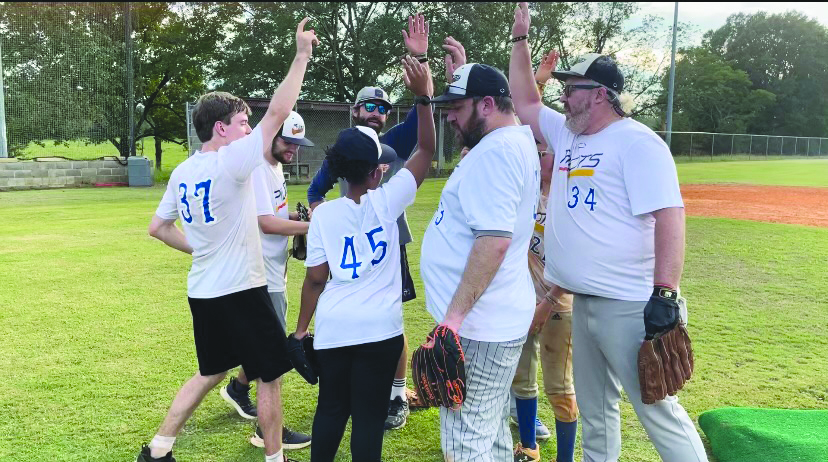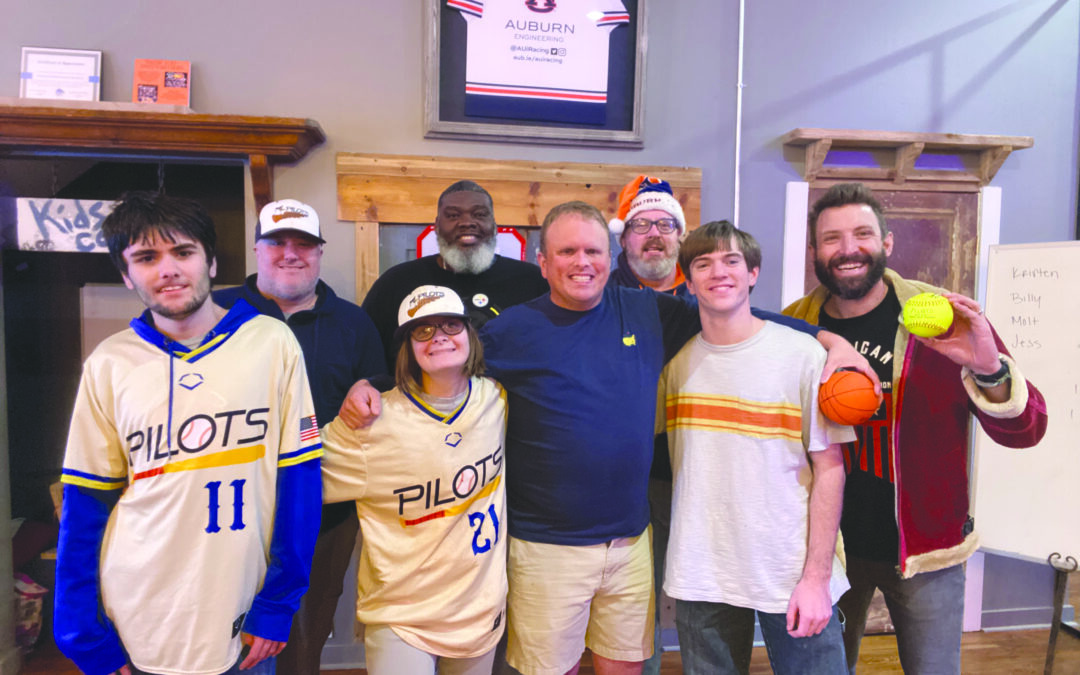
BY NOAH GRIFFITH
FOR THE OBSERVER
AUBURN –– Down a dirt trail on Lee Road 669 in Auburn you’ll find Beehive Baseball Park. At first glance, it’s nothing unusual — there’s teams hitting, fielding and pitching as any baseball club does. If you’re lucky, though, you’ll stumble upon the Auburn Pilots.
The Pilots are a part of the Alternative Baseball Organization, a league for people on the autism spectrum or with visionary or learning disabilities. There are other opportunities for people with disabilities to play baseball, but the ABO is unique because it caters to people age 15 and up, whereas those people “age out” of other leagues at that point.
Because of that, the Pilots are simply joyful to have the chance to play baseball. The ABO has been an open window for them to maximize their capabilities and discover their true potential.
“People go around thinking, ‘Oh, I bet (people with such disabilities) can’t do anything,’” said Pilots utility player Samuel Barrett. “Well sure they can’t, because nobody gives them a chance. All we need is one chance, and you just don’t know what kind of impact it can have on anybody.”
Alternative baseball has been that chance for Barrett.
He explained that he has developed from a shy, insecure kid that graduated from Central-Phenix City to a confident, articulate speaker and writer because of the way he was accepted while playing alternative baseball. Barrett was “scared to death” on his first day of practice, and now he’s a guy that players on his team look up to. Pilots infielder D’Ella David even called him the team “manager,” but then after Barrett’s denial, adjusted his title to team captain.
Barrett is not only more confident on the field, but he was empowered by ABO to attend Wendelstedt Umpire School in Ormond Beach, Florida, and has since thrived in his umpiring career for the AHSAA. He even compiled his umpiring experience into blog posts on Word Press and then into a book that was published in July 2024, titled “Umpire Diary.”
“Even before I joined, I saw the benefits that people on the autism spectrum and other special needs get when they join alternative baseball,” Barrett said. “They get the same social benefits as I got when I first started high school ball back in eighth grade. Leading up to that, I wasn’t a very popular person; I just made my grades and that was pretty much it.”
Then, with his team surrounding him in a group interview, Barrett continued to describe the impact playing in the ABO has had on him.
“But then, I came along to [the Pilots] – I knew absolutely nobody and I was scared to death, but that didn’t matter,” he recalled as the team laughed around him. “People just embraced me. I had no idea why, but they did just because I was there… Me being able to speak this articulately – I don’t know if I would be able to do it if it wasn’t for this team.”
Alternative baseball sprouted in Auburn in 2019 when ABO founder, Taylor Duncan, reached out to Evan Crawford, a 2008 Auburn University graduate and baseball player, about starting a team in Auburn. Crawford accepted the role as head coach of the Pilots and has loved seeing his players play with pure excitement and build each other up as well.
Crawford and assistant coach Randall Rowe now coach a squad of seven players that has become a “family,” according to player Angel Allen. They strive toward Duncan’s goal to provide an “authentic baseball experience,” which the players value highly.
Of course, that authenticity also means getting a little dirt on the jerseys. David made sure to make that obvious – after all, she is known as “the dirtiest player.” It wouldn’t truly be baseball without a few dives and slides.
ABO baseball provides an environment where players are free to be themselves. In fact, it’s a place where that’s encouraged and celebrated, and that’s what makes it so special.
“When I was younger, I went to camp with people who didn’t have disabilities; I was doing fine, but some people made fun of me,” David said. “Then I came here to play baseball with people with disabilities, the first time I played baseball, and I just fit in like a puzzle. I didn’t feel like an outsider. I felt like this is where I belong.”
It started on the field, but David’s experience with alternative baseball has led to freedom and acceptance in other areas of her life, too.
She works alongside other people with disabilities at Bitty and Beau’s Coffee Shop in downtown Auburn, which has allowed her to feel more understood. Not to mention, she’s done some recruiting to get her coworkers to join her baseball team. She recruited her coworker, Angel Allen, and now they arrive to work at Bitty and Beau’s Coffee early each day just to talk ball.
“Now, I work with people with disabilities, I go to school with people with disabilities,” David said. “I’m like, ‘This is my group.’ They understand how I feel.”
The Pilots’ joy for baseball is contagious, and they hope to spread it to whoever wants to watch or even jump into the action.
The Pilots are anticipating their first ever home game at Auburn’s Duck Samford Park on Saturday, Oct. 19 at noon CST. This will be a community event for the people of Auburn to get involved and maybe even help the Pilots find more players, as they still need two more to be able to fill all nine positions and register to compete with other ABO teams.
Former Auburn University and Atlanta Braves players will play alongside the Pilots in that game, including Tim Hudson, Braves Hall-of-Famer and Pilots team sponsor. Hudson will be joined by current Auburn University baseball coach, Butch Thompson, and Auburn University wheelchair basketball coach, Robb Taylor. Auburn Mayor Ron Anders will also be in attendance.
“We encourage others to come out and play with us if they want to,” Crawford said. “Maybe someone that’s a little shy and doesn’t know if they’d fit in or doesn’t know if they’d be able to play or not, we want them to be able to come to the game, see how it’s played and see that they could play with us as well.”
Admission to the game is free, though donations are encouraged. Visit alternativebaseball.org to learn more.


